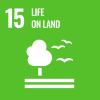- Countries/Regions
- Turkey
- Category
- Research
- Academic Field
- Agriculture
- Related goals of SDGs


| Keyword |
Turkey, Alkaline paddy field, Microbiome, Carbon/nitrogen dynamics |
Information on Niigata University
| Name of the professor/researcher |
(1)HARADA Naoki, (2)SUZUKI Kazuki, (3)ASILOGLU M. Rasit, (4)NAGANO Hirohiko |
| Position/Faculty |
(1)Professor, Faculty of Agriculture, (2)Associate Professor, Faculty of Agriculture, (3)Assistant Professor, Faculty of Agriculture, (4)Assistant Professor, Faculty of Agriculture |
Information on the Counterpart
| Countries/Regions |
Turkey |
| Faculty/Institution |
Ankara University |
Detailed Information/Report on Activities
Turkey is the third largest rice producer in Europe, producing over 900,000 tons per year from approximately 1.16 million ha of rice fields. The soil pH in Turkey is generally high, and rice is regularly grown in alkaline (saline) paddy fields with a pH of 8 to 9. This study aims to clarify the characteristics and functions of the rice rhizosphere microbiota (bacteria, archaea, and protists) and to examine the dynamics of soil carbon and nitrogen, with a focus on greenhouse gas (GHG) emissions, in this globally rare alkaline paddy field. Through this study, we aim to clarify the differences in the formation mechanisms of the paddy microbiota from acidic to alkaline conditions, and to obtain knowledge that will contribute to the low-input sustainable rice production, carbon sequestration in paddy soils, and the reduction of GHG emissions.


